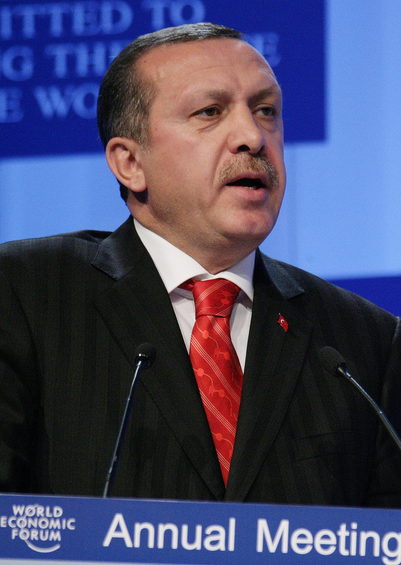Erdogan’s Futile Yearning for Omnipotence
Turkey has become too diverse demographically, too big economically and too complicated politically for one person to shape in his own image.
May 2, 2017

Recep Tayyip Erdogan has become the most unassailable Turkish leader since Mustafa Kemal Ataturk. But while half the country loves him, the other half loathes him.
His April 16 constitutional referendum was not the triumph he had hoped for – far from it. The unfairness of the campaign environment and irregularities at the ballot box have called his mandate into question.
Yet, rather than entertaining doubts about the results, Erdogan has decided to push ahead, declaring himself omnipotent president.
Erdogan now wants to shape Turkey in his own image as Ataturk once did, funneling state resources into top-down social engineering (e.g., using education policy to influence young Turks).
Turkey’s societal polarization
Turkey has simply become too diverse demographically, too big economically and too complicated politically for one person to shape in his own image.
Erdogan’s questionable mandate will only exacerbate Turkey’s deep societal polarization. As much as he will try, Erdogan cannot impose his vision in full because Turkey is a mélange of social, political, ethnic and religious groups, quite a few of which oppose his agenda.
Erdogan’s particular problem is that many of Turkey’s coastal cities (which represent a majority of the country’s GDP) voted against the referendum. Erdogan even lost in his hometown of Istanbul, including his own neighborhood.
Overall, a near majority of Turks voted no — perhaps even more if the reported electoral irregularities prove large enough.
For example, despite Erdogan’s efforts to create a class of crony Islamist capitalists, the bulk of the country’s wealth is still aligned with the Turkish Industry and Business Association (TUSIAD) which is wedded to secular, democratic, liberal, and European values.
Turkey’s three trajectories
Similarly, Turkey will soon become the first Muslim-majority country to achieve universal literacy, diluting the effects of Erdogan’s overwhelming media control and his devotion of massive state resources to the pre-referendum “yes” campaign.
The question now is whether Turkey’s wider right wing, which traditionally polls at around 60%, can provide an alternative to Erdogan.
Turkey seems to have three possible trajectories moving forward. First, the current state of crisis could continue, with the pro-Erdogan half of the country believing they live in heaven and the anti-Erdogan half thinking hell.
Second, if Erdogan realizes that he cannot continue governing in his current fashion as long as the country is genuinely democratic, he might decide to become autocratic enough to end democracy in Turkey.
A third, more remote possibility is that deep internal polarization — coupled with further terrorist attacks by the Islamic State and the Kurdistan Workers Party (PKK) or nefarious activities by neighbors like the Assad regime, Russia, and Iran — could catapult Turkey into civil conflict.
Moscow’s role
Whatever the case, Russia’s role as Erdogan’s nemesis seems assured. Moscow’s support for the PKK-aligned People’s Defense Units (YPG) in Syria threatens Turkish security interests.
For his part, Vladimir Putin believes Ankara’s brand of Sunni political Islam could politicize and radicalize his own Muslim minority, which constitutes 15-20 percent of Russia’s population and has deep ethnic and historical ties to Turkey.
Yet, the possibility of greater tensions with Moscow does not mean Turkey will return to the West’s bosom. Foreign policy has become a subset of Erdogan’s domestic agenda and his followers made the EU a prime punching bag in the run-up to the referendum.
This hard nationalist line will probably extend to U.S. cooperation with the YPG as well.
The voting results also demonstrated that Turkey’s Nationalist Action Party (MHP) is splintering: its conservative nationalist central and northeastern Anatolian voters are flocking to Erdogan, but its coastal and urban voters are peeling off.
A worrisome future
To permanently secure the central and northeastern Anatolian supporters, he will presumably maintain an ultranationalist stance on foreign policy issues.
In the longer term, however, he will probably seek to weaken the MHP such that it falls below the 10% electoral threshold for entry to parliament.
On the domestic policy front, Erdogan has called for restoration of capital punishment. If this happens, Turkey would be kicked out of the Council of Europe, meaning Turkish citizens would no longer have access to the European Court of Human Rights to arbitrate disputes.
There remains a fourth possible trajectory, one that excludes Erdogan but is driven by his achievements. He has made Turkey a middle-class society, so citizens are now making very middle-class demands for a liberal Turkey.
Yet, the opposition remains divided and lacks a charismatic leader. Until someone emerges who can effectively make the case for a liberal state — one that provides freedom of religion for one half of the country and freedom from religion for the other half, as well as unfettered liberties for all citizens, including Kurds — Turkey’s future remains worrisome.
Takeaways
Erdogan’s questionable mandate will exacerbate Turkey's deep societal polarization
Can Turkey's wider right wing, which traditionally polls at around 60%, provide an alternative to Erdogan?
Putin believes Ankara's brand of Sunni political Islam could radicalize his own Muslim minority.